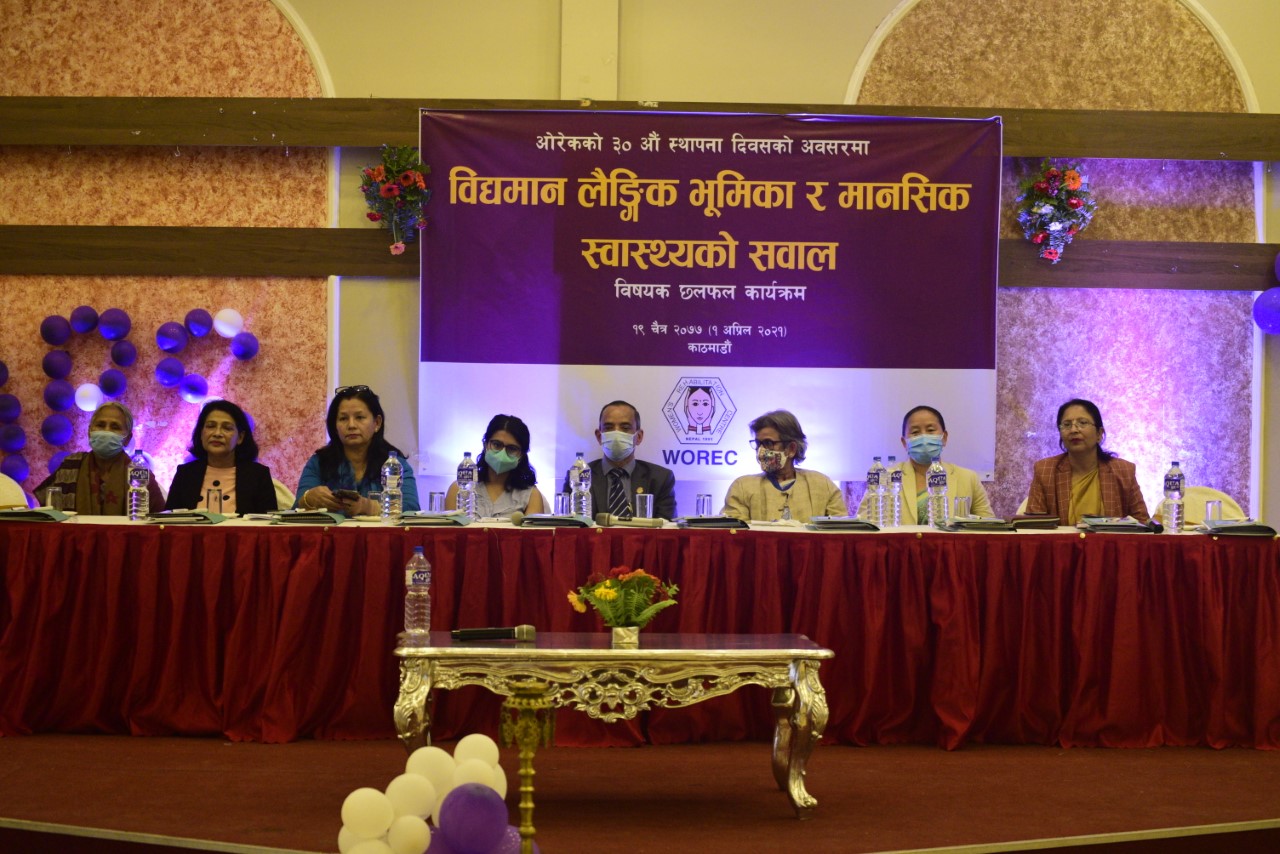
To commemorate the 30th anniversary of WOREC, a panel discussion was organized on "Existing gender roles and mental health issues" on 1st April 2021 with the aim of highlighting and analyzing the current situation of mental health issues, including suicide in Nepal from an economic, social and gender perspective. The program was inaugurated by the chief guest, Honorable Minister Dr Shivamaya Tumbahamphe. Click here to view the concept note of the panel.
The panel discussion featured Prof. Dr Saroj Prasad Ojha, Senior Psychiatrist, Prof. Dr Ganga Pathak, Senior Psychologist, Prof. Dr Kusum Shakya, Economist and Jyotika Rimal, Sociologist. The discussion was moderated by Mr Lubha Raj Neupane, Executive Director of WOREC.
Speaking at the program, Honorable Minister Dr Shivamaya Tumbahamphe said that unless the person doesn't realize that with help, one can overcome suicidal feelings, it will be challenging to prevent suicide. "Taking one's own life is never the right solution to any challenge one may be facing. It is essential to seek help when suicidal thoughts occur because medical treatment usually is successful in diminishing these thoughts," said Tumbahamphe.
In the keynote address, Prof. Dr Ganga Pathak, Senior Psychologist, said that mental illness is the most neglected and overlooked health problem in developing countries like Nepal due to its invisible nature. "Unlike any other physical illness that can be seen, mental illness is invisible to the naked eye. One cannot see anxiety or depression, or the accompanying pain associated with it, but it can be deadly like any other disease if left untreated. However, due to its invisible nature, people find it difficult to understand mental illness," said Pathak.
According to the World Health Organization, 80,000 people worldwide die each year due to suicide, and suicide is the third leading cause of death among the 15 to 19 years old age group. Seventy-nine percent (79%) of the world's suicides occur in low- and middle-income countries.
In the context of Nepal, The National Mental Health Survey, Nepal 2020 found that among the adults, 10 percent had experienced mental disorders in their lifetimes, and 4.3 percent were currently suffering from mental issues. The nationwide prevalence of suicidality, also known as suicidal thoughts or suicidal ideation, was at 7.2 percent. A 2019 pilot study for the National Mental Health Survey estimates that 2.2 million Nepalis, aged between 16 and 40 years, suffer from some form of mental illness.
Prof. Dr Saroj Prasad Ojha, the Senior Psychiatrist, pointed out that not only the people lack compassion towards those who have a mental illness, but there is also a stigma attached to mental illness in society. "Due to the stigma surrounding mental health issues and the fear of being discriminated for having a mental illness, often people avoid, or delay seeking treatment and instead suffer in silence," said Ojha.
Ojha further requested everyone attending the program to take the initiative to talk to the person if one recognizes the signs of mental health problem in him/her. "Sometimes, all a person wants is an empathetic ear; all he or she needs is to talk it out. Just offering a listening ear and an understanding heart for his or her suffering can be a big comfort," said Ojha.
.jpg)
Despite mental health emerging as a health priority, for the fiscal year 2018-2019, the government only allocated 4.29 percent of its total budget to the 'health and population' category. Although the mental health policy in Nepal was formulated in 2052 BS, the mental health program has not received much priority in the national health agenda of Nepal.
There is also a severe shortage of trained professionals like psychologists and psychiatrists to deal with mental health, especially in rural areas. According to estimates, there are an estimated 130 psychiatrists in the country, with less than 30 working in government hospitals. Thus, Pathak and Ojha also highlighted the need for community-level and national-level policies to prevent suicides and enhance mental health literacy and behaviour change.
Speaking on mental health in the time of lockdown, Prof. Dr Kusum Shakya, Economist, said that the Covid-19 pandemic and lockdown have created fear and anxiety among people, leading to short-term and long-term mental health implications, especially for women.
"The gendered division of labour has increased workload on women where they are expected to juggle between working from home as well as taking care of their entire support networks. There have also been reports on the increase in domestic violence as lockdown has forced women to confine with their abusers. All of these have taken a toll on their mental health," said Shakya.
According to a UN report, violence against women has increased by more than 25% in many places worldwide. Even in Nepal, the helplines run by different women-based organizations reported on getting many calls from domestic abuse victims.
Various studies have found that the Covid-19 pandemic and the nationwide lockdown take a toll on people's mental health. According to the news reports, during the first 74 days of the first lockdown in 2020, 1,227 people across the country committed suicide. Among them, 149 were teenagers. Data of the Non-Communicable Disease and Mental Health Section of the Epidemiology and Disease Control Division also show that 6,261 people took their own lives in the fiscal year 2019-20.
Along with the panel discussion, major findings of the research entitled "Unpacking socioeconomic causes related to suicide from gender perspective," conducted by WOREC in Morang district was also shared in the program.
The qualitative research findings show that the reasons to commit suicide in male and female were different. For instance, females are disproportionately burdened with social causes, whereas males are more burdened with economic causes that have pushed them to commit suicide.